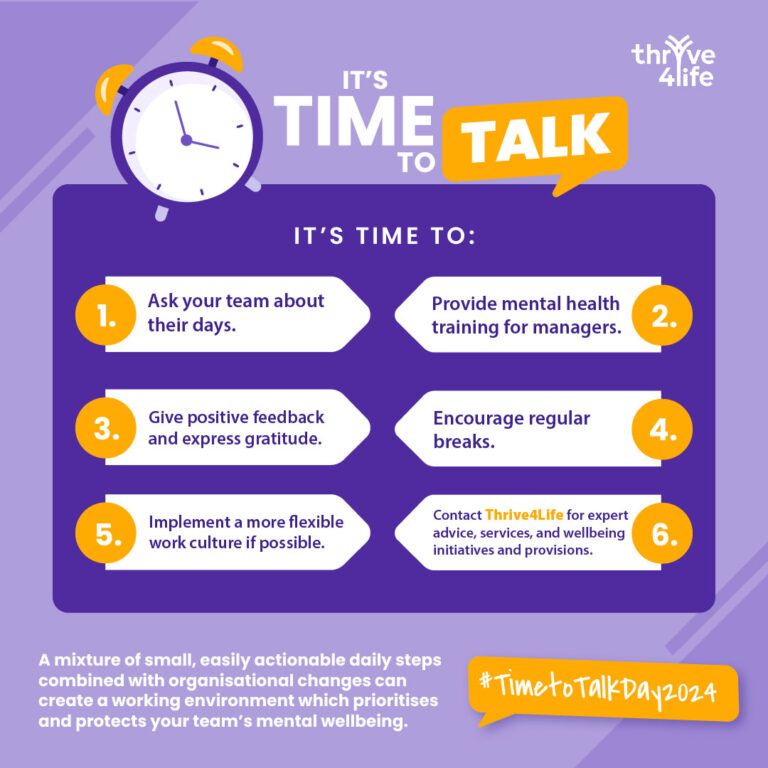Time to Talk Day 2024: What You Can Do to Support Your Team’s Mental Health
On the 1st of February, it’s Time to Talk Day.
Time to Talk Day offers the perfect opportunity to engage your colleagues and teams in conversations about mental health, advocate for a better approach towards mental well-being in the workplace, and support those around us with their emotional health. Compassionate, open conversations can have a strong, long-lasting positive impact on any workplace, helping to safeguard and prioritise your employees’ mental health and wellbeing. In this blog post, we’re discussing why Time to Talk Day is relevant to your business, including how you can mark this Day with your team and some wider mental health strategies and commitments you can carry forward well after the Day itself and into the future.
What is Time to Talk Day?
Developed by the mental health charity Mind in collaboration with Rethink Mental Illness, Time to Talk Day reminds and encourages us to talk about mental health with our friends, families, and co-workers. Conducted at community centres, sports clubs, educational institutes, and offices across the UK, Time to Talk Day can be held in your workplace to address and raise awareness of mental health concerns, risk factors, and coping mechanisms.
As a designated event to discuss mental health, recognising Time to Talk Day can help remove the stigma around what may seem an uncomfortable topic, encouraging your employees to talk freely and share how they feel. As emphasised by Time to Talk, a conversation has the power to change lives, and expressions of empathy, understanding, and support can go a long way in helping an employee take care of their mental well-being. Why is Time to Talk Day important for your workplace?
According to the Health and Safety Executive, 1 in 4 individuals in the UK face a mental health problem at one or more points in their lives, with anxiety and depression being the most common. Workplace stress, compounded with the problems we all face in our daily lives, can have a severe impact on you and your employees’ mental health, leading to symptoms of anxiety, depression, exhaustion, and burnout. MHFA England’s most recent statistics from 2023 highlight poor mental health as the reason for over 51% of long-term sick leave. A survey undertaken by Deloitte also revealed that 60% of employees across different organisations were seriously considering quitting their current roles for a job that would better support their mental well-being. These employees reported heavy workloads, unsupportive policies, and lack of skills training for specific roles and responsibilities as aspects of their work which all negatively impacted their mental health. These insights highlight how serious the impact of poor employee mental health can be, with stressed out, anxious, or depressed employees unable to perform and feel their best. Not only will employees be less engaged in their workplace if they’re suffering from poor mental health, but your organisation’s productivity can suffer from delayed, lower-quality, or incomplete work – not to mention the damage an unsupportive culture can have on your reputation as an employer.
There can be many reasons for experiencing poor mental health, and work might have nothing to do with it. However, regardless of why an employee is struggling, it’s your responsibility as an employer to support them where you can, doing what’s possible to prioritise their wellbeing actively. A supportive, caring work environment can make any issues being experienced outside of work easier to manage.
Under the Equality Act 2010, many mental illnesses can be categorised as disabilities if they impede an individual’s ability to carry out day-to-day tasks. As an employer, you may be legally responsible for making reasonable adjustments to support employees facing mental health issues. This makes it even more important to initiate and encourage conversations about mental health in the workplace!
Time to Talk Day in Your Workplace: The 5 Key Principles
Time to Talk Day is all about having dialogue, opening up, and sharing our personal experiences with our mental health. These conversations can be adapted to the needs of your workplace and employees, ranging from casual chats to educational seminars and more intimate peer support groups. At Thrive4Life, we recommend anchoring these conversations around the following key principles:
- Empathy
- Open communication
- Inclusivity
- Awareness
- Support
A conversation structured around these principles may look something like this:
- Asking the employee how they are doing
- Letting them know you are there to support them and that they can come and discuss any mental health needs (such as taking time off or adjusting their workload) with you directly
- Sharing some personal experiences dealing with work stress, feeling overwhelmed or under pressure, and extending understanding towards them if they’re experiencing similar issues
- Reminding them that they are valued as individuals and that you prioritise their well-being before output
- Offering resources such as support groups, tips for improving wellbeing, and encouraging them to tell you what they need or would benefit from – e.g., professional aids (such as counselling services)

These types of conversations will allow you to connect with your employees on a deeper level, have more honest and transparent conversations, gain insights into the different mental health needs of each individual, get familiar with personal boundaries, and be adequately prepared to offer resources that will help your team lead happier, healthier, and more balanced lives.
Going Forward: Actioning Your Learnings From Time to Talk Day
The conversations held on Time to Talk Day can help highlight the specific mental health issues your employees may be struggling with. Armed with these insights, you can then take appropriate measures to confront, mitigate, and manage the problems highlighted by your employees. These measures can take the form of wider organisational changes or small commitments.
Thrive4Life’s Top 4 Recommendations for Organisational Commitments:
1. If Possible, Implement a More Flexible Working Culture: A flexible working culture involves offering hybrid or remote working opportunities, giving employees more control over their schedules, and adapting workloads according to individual circumstances and abilities. This approach favours output over monitoring and micromanaging the exact amount of time employees spend in the office or log on a specific task. Instead, you can allow your employees to work on their own schedules, take breaks when needed, and work from their own space rather than mandating attendance in the office. Flexible work policies can help reduce work stress and pressure by allowing employees autonomy over their routines. Allow your employees to customise their approach to handling a specific task, identify what best suits their needs, and focus on the quality of the work produced rather than quantifying hours spent in the process. Work-related stress can also be alleviated when employees know they have the opportunity to adjust their workloads and aren’t stressed about approaching their manager to help them share tasks or roles when needed.
2. Provide Mental Health Training for Managers: Training managers in mental health skills can mean employees’ first port of call has the professional training and knowledge to support them with whatever mental health issue they’re experiencing. The CIPD recommends training managers in the skills and behaviours needed to engage staff in mental health conversations.
- Thrive4Life offers a designated Line Management Training Programme that trains your line managers to help employees by teaching them how to spot the warning signs of stress, learn coping mechanisms, and prepare for crisis management.
- Completing our Mental Health First Aider course can also equip any of your managers or employees with an MHFA England accreditation, qualifying them to offer professionally taught, best-practice mental health support for their colleagues.
- First Aiders can then continue to supplement their knowledge and consult experts for bespoke advice for their organisation through our Mental Health Skills Development Programme, which offers the opportunity to refresh their skills, keep on top of industry advice, and access new information on mental health.
3. Seek Expert Advice and Services: Getting advice from mental health professionals is a safe and effective way to offer support to your employees.
- You can develop organisation-specific work plans and mental wellbeing strategies with Thrive4Life’s Wellbeing Consultancy services. Our health and wellbeing experts will identify your employees’ mental health needs, evaluate gaps in your existing policies, and strategise the steps you need to take to overcome these gaps.
- Our Health and Wellbeing monthly ePublications can also help you disseminate mental health-related information across your organisation (as well as useful up-to-date knowledge and research on a vast range of physical health topics).
- Furthermore, purchasing access to our Employee Health and Wellbeing Discovery Hub can provide your team with access to a library of e-content continually updated with the latest mental and physical health advice, findings, and reports.
- Your staff can also attend regular in-person and online webinars led by experts and leading voices in the field of health and wellbeing. These educational talks can increase your employees’ awareness and understanding of a range of health issues and help to break the stigma surrounding the types of mental health topics that Time to Talk Day encourages us to broach.
4. Develop Wellbeing Initiatives: Wellbeing initiatives are a great way to promote a positive work culture. These initiatives can be focused on mental health to provide comfort and relief to struggling employees.
- These can include regular workshops on topics such as stress management, resilience, and mindfulness. For example, mindfulness and meditation sessions could be introduced via guided sessions or by offering free or subsidised subscriptions to a meditation app or membership to a yoga studio.
- Similarly, you could try integrating art and creativity initiatives as a solution for stress and a way to encourage self-expression. This could take the form of art workshops like pottery classes or collaborative creative projects such as decorating a shared office space.
- Physical activity can also be encouraged to allow stress relief and boost serotonin (i.e. the ‘happy hormone’ that lifts your mood). In light of this, you could provide on-site fitness classes for interested employees, such as group yoga or pilates sessions, or encourage them to take breaks during the working day for exercise and to get some fresh air. Walking and running groups can also be created to build office camaraderie and encourage outdoor activity.
It’s not all about the big changes. These recommendations for company-wide provisions should be paired with individual steps you and your employees can take to boost your mental well-being and that of those around you.
These daily steps can be as simple as:
1. Asking each other about your day
2. Providing positive feedback and appreciation on work-related tasks
3. Having a light-hearted discussion over a tea break
4. Taking and encouraging the taking of regular breaks
5. Teaching simple coping mechanisms such as deep breathing or stretching
6. Listening to some music on noise-cancelling headphones
7. If working from home, lighting a scented candle
8. Thinking about how you can get more natural light into your workspace, whether at home or in the office
9. Providing herbal teas for your team like chamomile or lavender for stress reduction
10. Expressing gratitude and appreciation when a colleague helps with a task
11. Suggesting or participating in walking meetings for a change of scenery, physical activity, and some fresh air. If you want to chat to someone about their wellbeing, sometimes it’s easier to open up while walking side by side instead of sitting opposite each other, which can feel very intense and interview-like.
These small steps can have a big impact by encouraging healthy habits and creating a positive and supportive work environment among teams and colleagues.
A Closing Note
Time to Talk Day may take place once a year, but its positive impact can be longstanding. It reminds us to take care of each other, have compassion, and be more considerate towards anyone struggling with mental health issues. Time to Talk Day is an ideal opportunity to refocus your attention on your employees’ mental wellbeing needs. Our recommendations and guidelines foregrounding the key principles of empathy, communication, inclusivity, awareness, and support can help you address any workplace barriers to mental wellbeing and offer your employees a safer and healthier working environment. A single conversation can catalyse major change, so let’s get talking this Time to Talk Day!
References
1. ‘Time to Talk Day. Mind and Rethink Mental Illness’. timetotalkday.co.uk/about/
2. ‘Mental Health Conditions, Work, and the Workplace.’ Health and Safety Executive. www.hse.gov.uk/stress/mental-health.htm
3. ‘Ten Workplace Mental Health Statistics for 2023’. MHFA England. mhfaengland.org/mhfa-centre/blog/ten-workplace-mental-health-statistics-for-2023/#:~:text=The%20impact%20of%20poor%20mental%20health%20on%20UK%20employees&text=Poor%20mental%20health%20accounts%20for,%2C%20or%20anxiety%20%5B2%5D
4. ‘The Wellbeing at Work Survey 2023’. Deloitte. www2.deloitte.com/uk/en/insights/topics/talent/workplace-well-being-research.html
5. ‘Equality Act 2010’. UK Gov. www.legislation.gov.uk/ukpga/2010/15/contents
6. ‘Five Ways To Improve Employee Wellbeing in the Workplace’. Forbes. www.forbes.com/sites/forbesbusinesscouncil/2022/10/24/five-ways-to-improve-employee-mental-health-in-the-workplace/?sh=4a496128781b
7. ‘Mental Health in the Workplace’. CIPD. www.cipd.org/uk/knowledge/factsheets/mental-health-factsheet/#two
8. ‘Line Management Training’. Thrive4Life.www.thrive4life.co.uk/health-wellbeing-training/line-management-training/
9. ‘Mental Health First Aid Course’. Thrive4Life. www.thrive4life.co.uk/health-wellbeing-training/mental-health-first-aider-course/
10. ‘Mental Health Skills Development’. Thrive4Life
www.thrive4life.co.uk/health-wellbeing-training/development-skills-workshop-for-mental-health-first-aiders/
11. ‘Health and Wellbeing Publications’. Thrive4Life. www.thrive4life.co.uk/health-wellbeing-promotion/health-wellbeing-publications/
12. ‘Employee Wellbeing Hub’. Thrive4Life. www.thrive4life.co.uk/health-wellbeing-promotion/health-and-wellbeing-discovery-hub/
13. ‘Educational Talks & Webinars’. Thrive4Life. www.thrive4life.co.uk/health-wellbeing-promotion/talks-and-webinars/
14. ‘How To Hack Your Hormones for a Better Mood’. Healthline. www.healthline.com/health/happy-hormone










